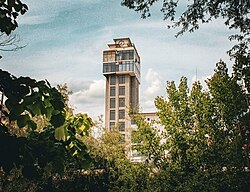Malisheva[a] is a town and municipality in Kosovo. According to the Kosovo Agency of Statistics (KAS) estimate from the 2011 census, there were 54,613 people residing in Malisheva Municipality, with Kosovo Albanians constituting the majority of the population.[3][4]
Malisheva[a] | |
|---|---|
Town and municipality | |
 Clocktower in Malisheva | |
| Coordinates: 42°28′58″N 20°44′46″E / 42.48278°N 20.74611°E | |
| Country | Kosovo |
| District | Prizren |
| Municipality | Malisheva |
| Government | |
| • Type | Mayor–council |
| • Mayor | Ekrem Kastrati (I Pavarur) |
| • Council | Malisheva Municipal Council |
| Area | |
| • Rank | 19th in Kosovo |
| • Municipality[1] | 306.42 km2 (118.31 sq mi) |
| Population (2011)[2] | |
• Municipality | 43,871 |
| Time zone | UTC+1 (CET) |
| • Summer (DST) | UTC+2 (CEST) |
| Postal code | 24000 |
| Area code | +383 (0) 39 |
| Vehicle registration | 04 |
| Website | kk.rks-gov.net/malisheve/ |
Geography
editMalisheva lies in the central part of Kosovo, namely in the eastern part of the Dukagjin Plain.[5] The territory of the municipality includes an area of 306.48 km2 (118 sq mi), and it is bordered by the municipalities of Drenas, Lipjan, Suhareka, Rahovec and Klina.[5] The suitable configuration of the terrain enables the municipality to have good traffic connections with the whole country. Most of the main cities of Kosovo are connected within a distance of about 40-55 km.
As for international connections, the passage of the Durrës - Merdarë highway through the territory of the municipality puts Malisheva in a favorable position.[5] This highway allows easy and fast connection with Albania and the port of Durrës, while the plans for the further continuation of this highway, as well as the construction of the new highway for Hani i Elezit will enable quality connections with the states and regional transport corridors.[5]
Climate
editThe dominant climate is the medium continental climate dominated with various Mediterranean elements, which is characterized by cold and long winters (in the mountain villages); warm summer (in lower villages).[5] The average temperature is 24.6 °C (76 °F) in summer and −10 °C (14 °F) in winter. The average amount of precipitation is close to 755.5 mm (29.74 in).[5]
Hydrography
editThe main river that passes through the municipality of Malisheva is Mirusha, which belongs to the White Drini basin.[5] In the lower part of the Mirusha river, in a length of 2 km, a gorge has been created with 16 river lakes of different sizes, connected to each other with a spectacular waterfall with a length of 21 m called Mirusha waterfalls (the second largest in Kosovo after that in Radavc-Drini i Bardhë).[5] Considering the environmental values that the Mirusha contains in its course and the surrounding spaces, the area around it has been declared a Natural Monument of Special Importance.[5]
History
editThe population of the town has historically been predominantly Kosovo Albanian. The town was largely destroyed by Serbian forces in 1998. Town residents only returned following the 1998 withdrawal of Serbian paramilitary police and military, in response to international pressures.[6]
Demography
editAccording to the Kosovo Agency of Statistics (KAS) estimate from the 2011 census, there were 54,613 people residing in Malisheva Municipality.[3] With a population density of 178,5 people per square kilometre, its urban population amounted to about 3,300, while the rural population was around 51,200.[3][7]
The majority of the population in the Municipality of Malisheva is Albanian with 99.8%.[5] Members of the Roma community are 70 inhabitants (0.13%), of the Ashkali community 14 inhabitants (0.03%), while 18 inhabitants (0.03%) are other or undeclared.[5]
See also
editNotes
edit- ^ a b (Albanian indefinite form: Malishevë, pronounced [maliˈʃɛvə]) or Mališevo (Serbian Cyrillic: Малишево, pronounced [mali'ʃevo])
References
edit- ^ "Komisioni për majten e territorit të Republikës së Kosovës" (PDF) (in Albanian). Prime Minister Office of Kosovo. p. 52. Archived from the original on 22 September 2020. Retrieved 17 June 2022.
- ^ "Population and housing census in Kosovo preliminary results - July 2024" (PDF). Retrieved 2 August 2024.
- ^ a b c "Regjistrimi i Popullsisë, Ekonomive Familjare dhe Banesave në Kosovë 2011 – Rezultatet Përfundimtare: Të Dhënat Demografike sipas Komunave" (PDF) (in Albanian). Kosovo Agency of Statistics. p. 15. Archived from the original (PDF) on 4 March 2016. Retrieved 17 June 2022.
- ^ "Regjistrimi i Popullsisë, Ekonomive Familjare dhe Banesave në Kosovë 2011 – Rezultatet përfundimtare" (PDF) (in Albanian). Kosovo Agency of Statistics (KAS). pp. 143–149. Archived (PDF) from the original on 10 January 2020. Retrieved 12 June 2022.
- ^ a b c d e f g h i j k "PLANI ZHVILLIMOR KOMUNAL I MALISHEVËS" (PDF).
- ^ Julius Strauss, "Albanian refugees nervously return to their Kosovo homes as Serbian troops pull out". Daily Telegraph via the National Post, October 28, 1998, p. A12.
- ^ "Atllasi i Regjistrimit të Popullsisë Kosovë" (PDF). Kosovo Agency of Statistics (KAS). p. 10. Archived (PDF) from the original on 17 May 2021. Retrieved 17 June 2022.
External links
edit- Municipality of Malisheva – Official Website
![Flag of Malisheva[a]](http://up.wiki.x.io/wikipedia/commons/thumb/1/15/Flag_of_Malisheva.png/100px-Flag_of_Malisheva.png)

![Malisheva[a] is located in Kosovo](http://up.wiki.x.io/wikipedia/commons/thumb/1/1f/Kosovo_adm_location_map.svg/250px-Kosovo_adm_location_map.svg.png)
![Malisheva[a] is located in Europe](http://up.wiki.x.io/wikipedia/commons/thumb/b/b4/Europe_blank_laea_location_map.svg/250px-Europe_blank_laea_location_map.svg.png)